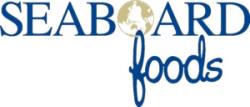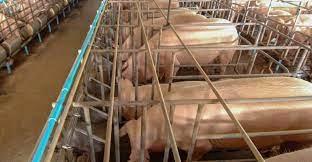 Following the implementation of California Proposition #12, Seaboard Foods will no longer be in a position to supply pork products to the state since the Company will not comply with space requirements that would prevent the use of gestation crates. Seaboard Foods produces 7.2 million hogs annually. California represents 15 percent of total U.S. pork consumption according to the National Pork Producers Council. Members of meat-producing organizations maintain “it would cost pork producers billions of dollars to convert (breeding) barns to meet Proposition#12 standards.”
Following the implementation of California Proposition #12, Seaboard Foods will no longer be in a position to supply pork products to the state since the Company will not comply with space requirements that would prevent the use of gestation crates. Seaboard Foods produces 7.2 million hogs annually. California represents 15 percent of total U.S. pork consumption according to the National Pork Producers Council. Members of meat-producing organizations maintain “it would cost pork producers billions of dollars to convert (breeding) barns to meet Proposition#12 standards.”
In a related announcement, Hormel Foods Corporation will fully comply with the law having initiated conversion of gestation stalls to group housing a number of years ago in a structured program of transition. Previously Smithfield Foods and Tyson Foods announced changes in their housing and management in anticipation of Proposition #12 and similar state laws and regulations.
It is a matter of record that the U.S. egg industry has converted close to one-third of production from conventional cages to alternative systems and has complied with both California Proposition #2 enacted in 2008 and California Proposition #12 adopted in 2018.
 To date challenges to Proposition #12 have been turned down by courts that have rejected the contention that regulations framed in terms of Proposition #12 violate the Interstate Commerce Clause. The Ninth Circuit rejected challenges by the North American Meat Institute in October 2020 and litigation initiated by the National Pork Producers Council and the American Farm Bureau litigation at the end of July 2021.
To date challenges to Proposition #12 have been turned down by courts that have rejected the contention that regulations framed in terms of Proposition #12 violate the Interstate Commerce Clause. The Ninth Circuit rejected challenges by the North American Meat Institute in October 2020 and litigation initiated by the National Pork Producers Council and the American Farm Bureau litigation at the end of July 2021.
Some industry organizations intend to appeal to the U.S. Supreme Court and have attempted to revive the dubious King Amendment intended to enjoin any state from restricting methods of livestock production. A proposed bill entitled Exposing Agriculture Trade Suppression Act (EATS) is unlikely to be enacted given conflicts with the Clean Air Act, the Clean Water Act and existing welfare legislation in states.
The pork industry should recognize that with respect to gestation crates, the train has long since left the station. Customers including major QSR and restaurant chains have already decided where and how their money will be spent and both legal and lobbying efforts to turn back the clock will be unsuccessful especially in the age of YouTube and the internet. Perhaps some institutional shareholders of Seaboard representing 18 percent of the equity will question the wisdom of the response to California Proposition #12. Given the 78 percent insider shareholding the Board considers that the Company is immune from criticism or that it can afford to forgo the market in California and many other states with similar legislation pending. Or maybe they are unfamiliar with King Canute.